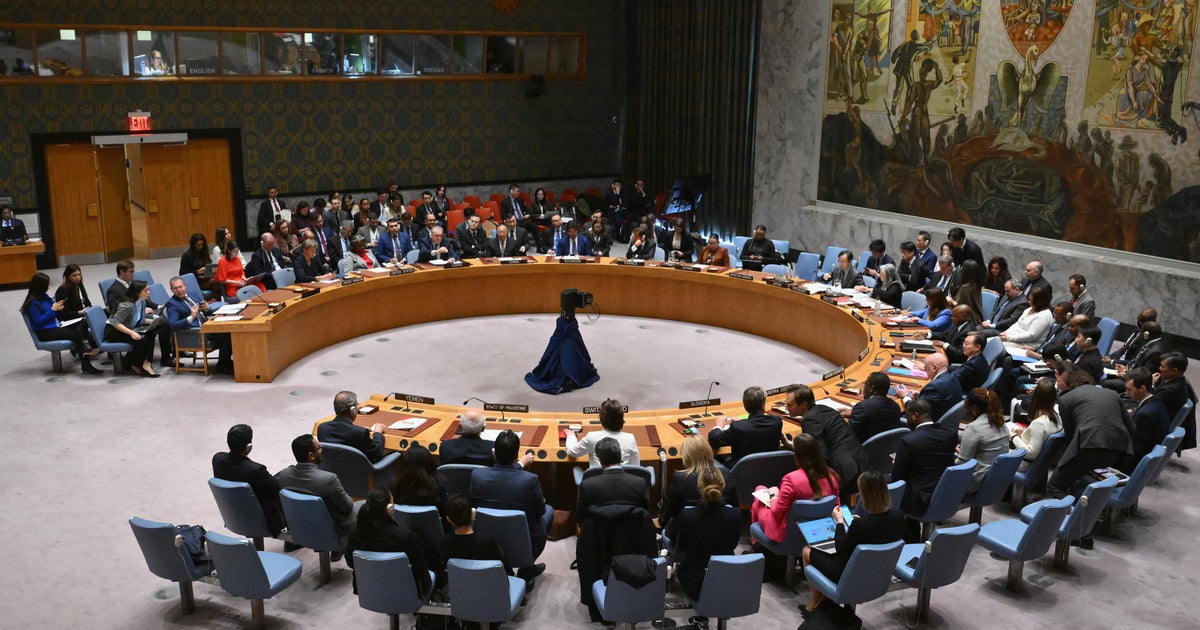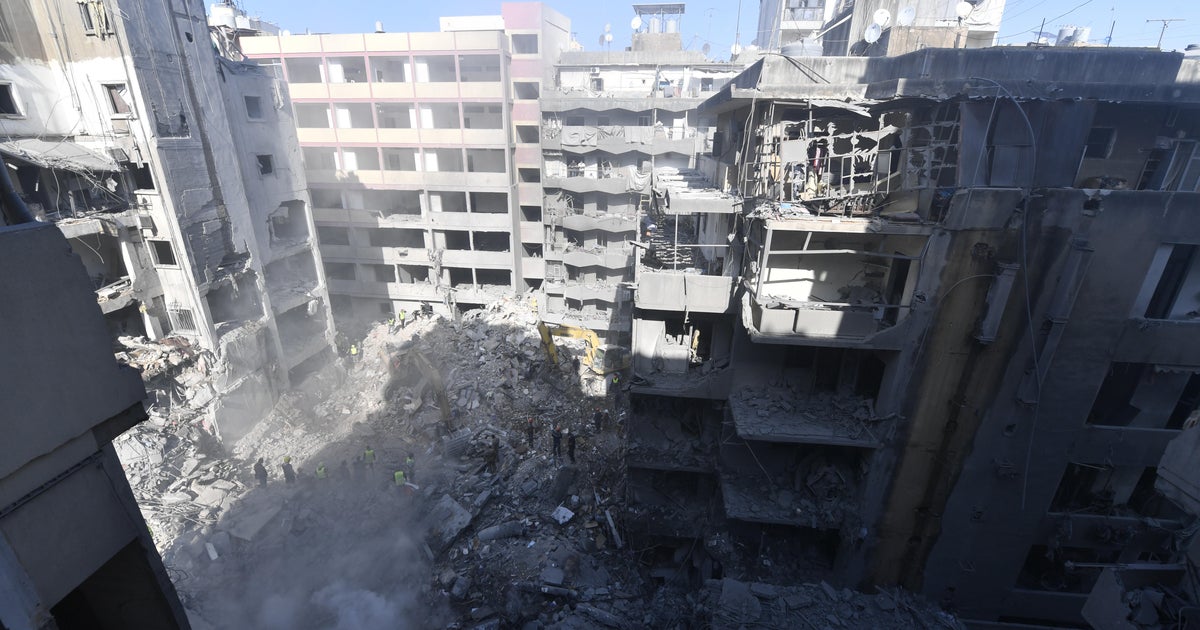CBS News
U.N. Security Council passes resolution demanding immediate Hamas-Israel war cease-fire, release of hostages

The United Nations Security Council on Monday demanded a cease-fire in Gaza during the Muslim holy month of Ramadan, its first demand to halt fighting. The United States abstained on the resolution, which also demanded the release of all hostages taken captive during Hamas’ Oct. 7 surprise attack in southern Israel. But the measure does not link that demand to the cease-fire during Ramadan, which ends April 9.
The vote comes after Russia and China vetoed a U.S.-sponsored resolution Friday that would have supported “an immediate and sustained cease-fire” in the Israeli-Hamas conflict.
The United States warned that the resolution approved on Monday could hurt negotiations to halt hostilities by the U.S., Egypt and Qatar, raising the possibility of another veto, this time by the Americans.
The resolution, put forward by the 10 elected council members, is backed by Russia and China and the 22-nation Arab Group at the United Nations.
A statement issued Friday night by the Arab Group appealed to all 15 council members “to act with unity and urgency” and vote for the resolution “to halt the bloodshed, preserve human lives and avert further human suffering and destruction.”
“It is long past time for a cease-fire,” the Arab Group said.
Because Ramadan ends next month, the cease-fire demand would last for just two weeks, though the draft says the pause in fighting should lead “to a permanent sustainable cease-fire.”
Since the start of the war, the Security Council has adopted two resolutions on the worsening humanitarian situation in Gaza, but none has called for a cease-fire.
More than 32,000 Palestinians in Gaza have been killed during the fighting, according to the Gaza Health Ministry. The agency does not differentiate between civilians and combatants in its count, but says women and children make up two-thirds of the dead.
Gaza also faces a dire humanitarian emergency, with a report from an international authority on hunger warning March 18 that “famine is imminent” in northern Gaza and that escalation of the war could push half of the territory’s 2.3 million people to the brink of starvation.
U.S. Ambassador Linda Thomas-Greenfield told the council Friday that the resolution’s text “fails to support sensitive diplomacy in the region. Worse, it could actually give Hamas an excuse to walk away from the deal on the table.”
“We should not move forward with any resolution that jeopardizes the ongoing negotiations,” she said, warning that if the diplomacy isn’t supported, “we may once again find this council deadlocked.”
“I truly hope that that does not come about,” Thomas-Greenfield said.
The United States has vetoed three resolutions demanding a cease-fire in Gaza, the most recent an Arab-backed measure on Feb. 20. That resolution was supported by 13 council members with one abstention, reflecting the overwhelming support for a cease-fire.
Russia and China vetoed a U.S.-sponsored resolution in late October calling for pauses in the fighting to deliver aid, the protection of civilians and a halt to arming Hamas. They said it did not reflect global calls for a cease-fire.
They again vetoed the U.S. resolution Friday, calling it ambiguous and saying it was not the direct demand to end the fighting that much of the world seeks.
The vote became another showdown involving world powers that are locked in tense disputes elsewhere, with the United States taking criticism for not being tough enough against its ally Israel, even as tensions between the two countries rise.
A key issue was the unusual language in the U.S. draft. It said the Security Council “determines the imperative of an immediate and sustained cease-fire.” The phrasing was not a straightforward “demand” or “call” to halt hostilities.
Before the vote, Russia’s U.N. Ambassador Vassily Nebenzia said Moscow supports an immediate cease-fire, but he criticized the diluted language, which he called philosophical wording that does not belong in a U.N. resolution.
He accused U.S. Secretary of State Antony Blinken and U.S. Ambassador Linda Thomas-Greenfield of “deliberately misleading the international community” about calling for a cease-fire.
“This was some kind of an empty rhetorical exercise,” Nebenzia said. “The American product is exceedingly politicized, the sole purpose of which is to help to play to the voters, to throw them a bone in the form of some kind of a mention of a cease-fire in Gaza … and to ensure the impunity of Israel, whose crimes in the draft are not even assessed.”
China’s U.N. ambassador, Zhang Jun, said the U.S. proposal set preconditions and fell far short of expectations of council members and the broader international community.
“If the U.S. was serious about a cease-fire, it wouldn’t have vetoed time and again multiple council resolutions,” he said. “It wouldn’t have taken such a detour and played a game of words while being ambiguous and evasive on critical issues.”
Friday’s vote in the 15-member council was 11 members in favor and three against, including Algeria, the Arab representative on the council. There was one abstention, from Guyana.
After the vote, Thomas-Greenfield accused Russia and China of vetoing the resolution for “deeply cynical reasons,” saying they could not bring themselves to condemn Hamas’ terrorist attacks in southern Israel on Oct. 7, which the resolution would have done for the first time.
A second “petty” reason, she said, is that “Russia and China simply did not want to vote for a resolution that was penned by the United States, because it would rather see us fail than to see this council succeed.” She accused Russia of again putting “politics over progress” and having “the audacity and hypocrisy to throw stones” after launching an unwarranted invasion of Ukraine in February 2022.
The resolution did reflect a shift by the United States, which has found itself at odds with much of the world as even allies of Israel push for an unconditional end to fighting.
In previous resolutions, the U.S. has closely intertwined calls for a cease-fire with demands for the release of Israeli hostages in Gaza. This resolution, using wording that’s open to interpretation, continued to link the two issues, but not as firmly.
CBS News
Here Comes the Sun: Jack Antonoff and more

Watch CBS News
Be the first to know
Get browser notifications for breaking news, live events, and exclusive reporting.
CBS News
Capturing Moriah Wilson’s Killer – CBS News

Watch CBS News
Be the first to know
Get browser notifications for breaking news, live events, and exclusive reporting.
CBS News
How to watch the Minnesota Vikings vs. Chicago Bears NFL game today: Livestream options, more

Getty Images
The Minnesota Vikings will take on the Chicago Bears today. The Vikings are currently 8-2, an impressive run so far this season, and will be looking to add a fourth win to their current streak after last Sunday’s 23-13 win against the Tennessee Titans. The Bears, on the other hand, are entering this game on the heels of a four-game losing streak after a tough 20-19 loss against the Green Bay Packers last Sunday.
Here’s how and when you can watch the Vikings vs. Bears game today, whether or not you have cable.
How and when to watch the Minnesota Vikings vs. Chicago Bears
The Vikings vs. Bears game will be played on Sunday, November 24, 2024 at 1:00 p.m. ET (11:00 a.m. PT). The game will air on Fox and stream on Fubo and the platforms featured below.
How and when to watch the Minnesota Vikings vs. Chicago Bears game without cable
You can watch this week’s NFL game on Fox via several streaming services. All you need is an internet connection and one of the top options outlined below.
Fubo offers you an easy, user-friendly way to watch NFL games on CBS, Fox, NBC, ABC, ESPN, and NFL Network, plus NCAA football channels. The Pro tier includes 200+ channels and unlimited DVR, while the Elite with Sports Plus tier adds NFL RedZone and 4K resolution. New subscribers get a seven-day free trial and all plans allow streaming on up to 10 screens simultaneously.
You can watch today’s game with a subscription to Sling’s Orange + Blue tier, which includes ESPN, ABC, NBC, and Fox. The plan offers 46 channels with local NFL games, nationally broadcast games and 50 hours of DVR storage. For complete NFL coverage, add Paramount+ to get CBS games, or upgrade with the Sports Extra add-on for additional sports channels like Golf Channel, NBA TV and NFL RedZone.
Watching NFL games, including Fox broadcasts, is simple with Hulu + Live TV, which includes 90 channels, unlimited DVR storage, and access to NFL preseason games, live regular season games and studio shows. The service includes ESPN+ and Disney+ in the subscription.
Want to watch today’s game live on your smartphone? If so, NFL+ streaming service is the solution you’re looking for. It lets you watch NFL Network and out-of-market games on mobile devices, with an upgrade option to NFL+ Premium that includes NFL RedZone for watching up to eight games simultaneously. Note that NFL+ only works on phones and tablets, not TVs.








